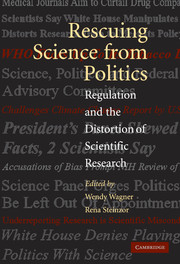Book contents
- Frontmatter
- Contents
- About the Contributors
- Acknowledgments
- Prologue
- Introduction: Principled Science
- PART I FREEDOM AND INDEPENDENCE
- PART II TRANSPARENCY AND HONESTY
- 5 The Data Wars, Adaptive Management, and the Irony of “Sound Science”
- 6 The Dual Legacy of Daubert v. Merrell-Dow Pharmaceutical: Trading Junk Science for Insidious Science
- 7 Using Science in a Political World: The Importance of Transparency in Natural Resource Regulation
- 8 Transforming Science into Law: Default Reasoning in International Trade Disputes
- 9 Two Models for Scientific Transparency in Environmental Law
- PART III A PUBLIC INFRASTRUCTURE FOR SCIENCE
- PART IV RECOMMENDATIONS AND CONCLUSION
- Index
6 - The Dual Legacy of Daubert v. Merrell-Dow Pharmaceutical: Trading Junk Science for Insidious Science
Published online by Cambridge University Press: 04 August 2010
- Frontmatter
- Contents
- About the Contributors
- Acknowledgments
- Prologue
- Introduction: Principled Science
- PART I FREEDOM AND INDEPENDENCE
- PART II TRANSPARENCY AND HONESTY
- 5 The Data Wars, Adaptive Management, and the Irony of “Sound Science”
- 6 The Dual Legacy of Daubert v. Merrell-Dow Pharmaceutical: Trading Junk Science for Insidious Science
- 7 Using Science in a Political World: The Importance of Transparency in Natural Resource Regulation
- 8 Transforming Science into Law: Default Reasoning in International Trade Disputes
- 9 Two Models for Scientific Transparency in Environmental Law
- PART III A PUBLIC INFRASTRUCTURE FOR SCIENCE
- PART IV RECOMMENDATIONS AND CONCLUSION
- Index
Summary
Judicial Distortion of Science
Daubert v. Merrell-Dow Pharmaceutical and its progeny are Supreme Court cases that aim at improving the quality of scientific expert testimony admitted into evidence in federal litigation and respond to the perceived threat posed by the use of “junk science” in the courtroom. In resolving a challenge to the validity of a scientific experts' testimony in a tort case, the Supreme Court in Daubert held that judges in reviewing expert testimony should follow the Federal Rules of Evidence, not Frye v. U.S. Moreover, in order for testimony to be admitted, it must be “reliable” and fit the facts of the case.
Despite the Supreme Court's laudable goals of improving the quality of the science in litigation, however, lower courts still seem to be struggling with scientific evidence in legal cases; judges often fail to review the science in toxic tort cases as scientists would have done, thus frustrating the aims of Daubert and two key subsequent decisions. These decisions reveal views that are contrary to sound scientific principles. Mistaken court conceptions of reasonable scientific evidence or of good scientific argument often then are propagated through the legal system by precedent or by merely following the Joneses of brethren courts. As a result, in their efforts to avoid junk science, or being misled by persuasive but suspect scientists, courts have done violence to the scientific process, constructed views of science that are not accurate, appeared not to have understood scientific reasoning, and lessened protection of the public's health.
- Type
- Chapter
- Information
- Rescuing Science from PoliticsRegulation and the Distortion of Scientific Research, pp. 120 - 142Publisher: Cambridge University PressPrint publication year: 2006



